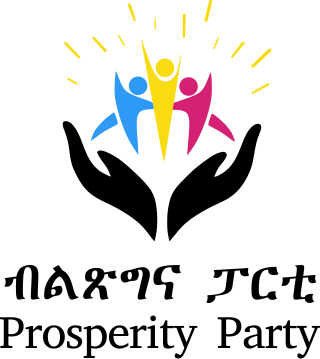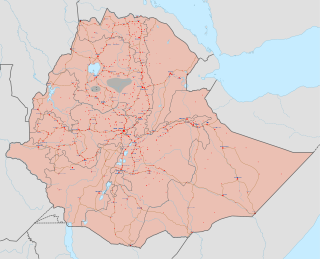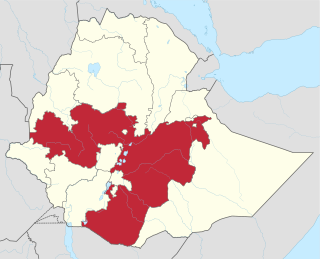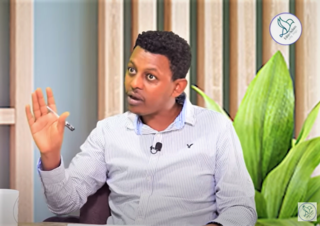
Abiy Ahmed Ali is an Ethiopian politician serving as the third Prime Minister of Ethiopia since 2018, and as the leader of the Prosperity Party since 2019. He was awarded the 2019 Nobel Peace Prize "for his efforts to achieve peace and international cooperation, and in particular for his decisive initiative to resolve the border conflict with neighbouring Eritrea". Abiy served as the third chairman of the Ethiopian People's Revolutionary Democratic Front (EPRDF) that governed Ethiopia for 28 years and the first person of Oromo descent to hold that position. Abiy is a member of the Ethiopian parliament, and was a member of the Oromo Democratic Party (ODP), one of the then four coalition parties of the EPRDF, until its rule ceased in 2019 and he formed his own party, the Prosperity Party.

The Oromia Broadcasting Network (OBN) is an Ethiopian public service broadcaster headquartered in Addis Ababa, Ethiopia. It is the leading media organization in the Oromia and broadcast on Eutelsat via the Ethiosat platform.
Events of 2019 in Ethiopia.

The 2021 Ethiopian general election to elect members of the House of Peoples' Representatives was held on 21 June 2021 and 30 September 2021. Regional elections were also held on those dates.

The Prosperity Party is a political party in Ethiopia that was established on 1 December 2019 as a successor to the Ethiopian People's Revolutionary Democratic Front (EPRDF) by incumbent Prime Minister Abiy Ahmed. The merger into a countrywide party is part of Abiy's general policy of distancing the country's politics from ethnic federalism. It ran for the first time in the 2021 general election.

Fano is an ethno-nationalist Amhara militia and former protest movement. It has engaged in violent clashes throughout Ethiopia in the name of neutralizing perceived threats to the Amhara people. Fano has absorbed many units and personnel of the Amhara Regional Special Forces that did not integrate into the Ethiopian National Defense Force (ENDF). Fano militias are have been involved in armed conflicts with the Tigray People's Liberation Front (TPLF), the Oromo Liberation Army (OLA), and the ENDF. They have also clashed with the Sudanese Armed Forces (SAF) on the border of Ethiopia and Sudan.
Awol Kasim Allo is an Ethiopian academician, author and lecturer who started teaching law at University of Keele in 2016.

The Council of Ministers of Abiy Ahmed is the cabinet of the government of Ethiopia during the premiership of Abiy Ahmed since early 2018.
Filsan Abdullahi Ahmed, also called Filsan Abdi, is an Ethiopian activist and politician from the Somali Region. She is a founder of the Nabad project, a satellite television station for promoting communication and peace in Somali Region and between the Somali and Oromo communities.
Tsedale Lemma is an Ethiopian journalist who founded Addis Standard, a highly influential Ethiopian newspaper, in 2011.

Following the 2018 dissolution of the ethnic federalist, dominant party political coalition, the Ethiopian People's Revolutionary Democratic Front, there was an increase in tensions within the country, with newly resurgent regional and ethnically based factions carrying out armed attacks on military and civilians in multiple conflicts throughout Ethiopia.

The OLA insurgency is an armed conflict between the Oromo Liberation Army (OLA), which split from the Oromo Liberation Front (OLF) in 2018, and the Ethiopian government, continuing in the context of the long-term Oromo conflict, typically dated to have started with the formation of the Oromo Liberation Front in 1973.

The TDF–OLA joint offensive was a rebel offensive in the Tigray War and the OLA insurgency starting in late October 2021 launched by a joint rebel coalition of the Tigray Defense Forces (TDF) and Oromo Liberation Army (OLA) against the Ethiopian National Defense Forces (ENDF) and government. The TDF and OLA took control of several towns south of the Amhara Region in the direction of the Ethiopian capital Addis Ababa in late October and early November. Claims of war crimes included that of the TDF extrajudicially executing 100 youths in Kombolcha, according to deral authorities.

Abiy Ahmed's tenure as prime minister of Ethiopia began on 2 April 2018 with his swearing-in at the Ethiopian parliament, succeeding Hailemariam Desalegn. Abiy is the first person of Oromo descent to hold the office, and became chair of the ruling Prosperity Party after the dissolution of the Ethiopian People's Revolutionary Democratic Front (EPRDF) in November 2019.

Since the 1990s, the Amhara people of Ethiopia have been subject to ethnic violence, including massacres by Tigrayan, Oromo and Gumuz ethnic groups among others, which some have characterized as a genocide. Large-scale killings and grave human rights violations followed the implementation of the ethnic-federalist system in the country. In most of the cases, the mass murders were silent with perpetrators from various ethno-militant groups—from TPLF/TDF, OLF–OLA, and Gumuz armed groups.
The 1995 Ethiopian Federal Constitution formalizes an ethnic federalism law aimed at undermining long-standing ethnic imperial rule, reducing ethnic tensions, promoting regional autonomy, and upholding unqualified rights to self-determination and secession in a state with more than 80 different ethnic groups. But the constitution is divisive, both among Ethiopian nationalists who believe it undermines centralized authority and fuels interethnic conflict, and among ethnic federalists who fear that the development of its vague components could lead to authoritarian centralization or even the maintenance of minority ethnic hegemony. Parliamentary elections since 1995 have taken place every five years since enactment. All but one of these have resulted in government by members of the Ethiopian People's Revolutionary Democratic Front (EPRDF) political coalition, under three prime ministers. The EPRDF was under the effective control of the Tigray People's Liberation Front (TPLF), which represents a small ethnic minority. In 2019 the EPRDF, under Abiy, was dissolved and he inaugurated the pan-ethnic Prosperity Party which won the 2021 Ethiopian Election, returning him as prime minister. But both political entities were different kinds of responses to the ongoing tension between constitutional ethnic federalism and the Ethiopian state's authority. Over the same period, and all administrations, a range of major conflicts with ethnic roots have occurred or continued, and the press and availability of information have been controlled. There has also been dramatic economic growth and liberalization, which has itself been attributed to, and used to justify, authoritarian state policy.

Terara Network is an Ethiopian media company based in Addis Ababa. The company's main journalist who is the owner of the company is Tamerat Negera. The company was established on 26 September 2020, by Tamerat Negera through the charity funds raised by his friend Tariku Geleta.
Events in the year 2023 in Ethiopia.

The Welkait question involves a controversial territorial dispute surrounding the Ethiopian area Welkait, which is situated in the present-day Tigray Region. Welkait had been an independent area but was incorporated within Begmeder province, but after the fall of the Derg in 1991, the area was given by the TPLF government to Tigray's Western Zone. During Abiy Ahmed administration, the Tigray and Welkait Committee counterparts held peaceful talks in Gondar on 19 April 2018. Abiy pleaded the Welkait question should be addressed in peaceful resolution.

Political repression is a visible scenario under the leadership of Prime Minister Abiy Ahmed after 2018, characterized by severe human rights violation, restriction of press, speeches, dissents, activism and journalism that are critical to his government. Similar to TPLF-led EPRDF regime, there was a raise of censorship in the country, particularly internet shutdowns under the context of anti-terror legislation labelling them "disinformation and war narratives" since the raise of armed conflict in Ethiopia. In June 2018, Abiy unblocked 64 internet access that include blogs and news outlets.














